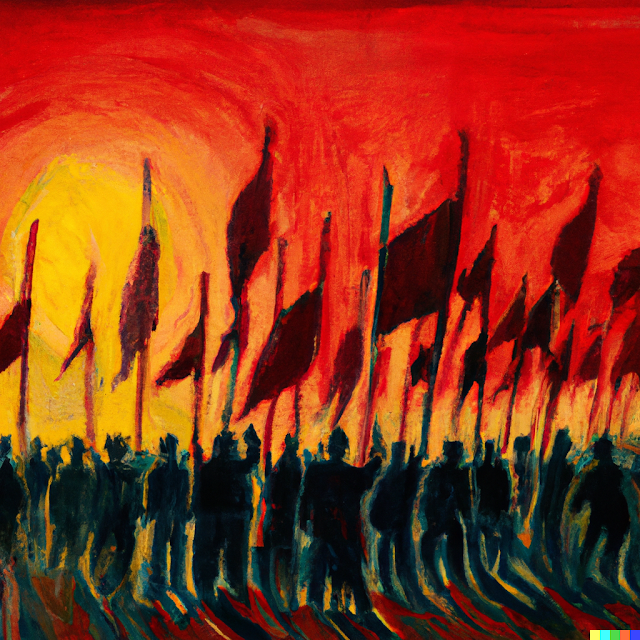The Case for Reparsanctions
A Satire upon the Recent "Resolution" of Conflict by Tena Thau
It is often argued that reparations should be provided to the victims of past injustices. Reparations can take many forms, but they are typically thought to include some form of financial compensation, and an acknowledgement and apology for harm that has been done.
But there may be an even better response to historical injustice than reparations—reparsanctions: imposing economic sanctions on the group of people to whom reparations are owed. This is the US government’s current policy vis-à-vis the people of Afghanistan, and in this essay, I’ll offer an elucidation and defence of the idea.
But let’s start with a little background first.
After the 9-11 attacks, the Bush administration chose to respond, not by going after the individual perpetrators and bringing them to justice (Evangelista, 2011), but by launching a global “War on Terror”, which has killed an estimated 897,000-929,000 people to date (Brown Costs of War Project, 2021). Tens of thousands of Afghan civilians were among those killed, and millions more Afghans have been forcibly displaced in the conflict (Vine et. al., 2021). In a new essay, Noam Chomsky and Nathan Robinson suggest that some form of reparations are owed to the people of Afghanistan, for all the harm that has been inflicted upon them.
But why bother with reparations when we can instead impose repar-sanctions? Last summer, the US froze $7 billion in Afghan central bank assets after the Taliban took power (Pollard, 2022). Half of that money—$3.5 billion—it plans to take from the Afghan people and give to American family members of 9-11 victims (even though the people of Afghanistan had nothing to do with the 9-11 attacks).
As a consequence, Afghanistan, which was one of the poorest countries in the world before the war even began, is currently facing a dire humanitarian crisis. According to the United Nations, “a staggering 95 percent of Afghans are not getting enough to eat” (United Nations, 2022). Some parents are selling an organ so they can feed their children (Barber, 2022). Nevertheless, the US’s current policy of repar-sanctions is justified. Here are three reasons why.
1.The US government has already done enough to help the people of Afghanistan.
At the start of the war, the Bush administration, in an extraordinary act of generosity, had US planes drop some packages of food over Afghanistan (in addition to the bombs). The packages, emblazoned with the US flag, included potatoes, biscuits, and beans in tomato sauce, and were enough to feed 1% of the Afghan population for one day (Garvey, 2001).
2. Repar-sanctions are more cost-effective than reparations.
As the above graph illustrates, repar-sanctions are more cost-effective than either cash transfers or building hospitals and schools.
3. Repar-sanctions foster goodwill.
Now that US troops have left Afghanistan, there is the risk that all the goodwill that we’ve built up during our neighbourly, 20-year presence in the region will begin to fade away. But the food shortages we’re now causing serve as a reminder to the Afghan people that, while they may not see our tanks rolling down their streets or our drones circling over their heads, we are still with them in spirit, and having a real impact on their lives. Whenever an Afghan person hears their stomach growl, or sees the scar on their body from the kidney they had to sell to stay alive, they’ll think of us!
Now, it might be tempting to look at the current situation in Afghanistan and think, “hey maybe we have a basic humanitarian duty to help our fellow human beings who are on the brink of starvation.” But this line of thinking overlooks a crucial fact—that we’ve already given the Afghan people the most meaningful gift there is, one that no amount of money can buy. The gift of our friendship. In a speech delivered in October of 2001, George W. Bush stated that “The United States is a friend to the Afghan people.” Two decades later, this bond of friendship remains strong as ever before.
Bibliography
Barber, H. (2022). Afghans forced to sell their kidneys as extreme hunger tightens its grip. The Telegraph.
Brown Costs of War Project. (2021). Human Cost of Post-9/11 Wars: Direct War Deaths in Major War Zones. Retrieved from: https://watson.brown.edu/costsofwar/figures/2021/WarDeathToll
Bush, G. W. (2001). Global War on Terror. George W. Bush Presidential Library. Retrieved from: https://www.georgewbushlibrary.gov/research/topic-guides/global-war-terror
Evangelista, M. (2011). Coping with 9/11: Alternatives to the War Paradigm.
Garvey, M. (2001). Along With Bombs, U.S. Drops Rations. LA Times.
Pollard, R. (2022). Joe Biden’s $7 Billion Betrayal of Afghanistan. Washington Post.
Robinson, N. & Chomsky, N. (2022). What Do We Owe Afghanistan? Current Affairs.
United Nations. (2022). Afghanistan: Food insecurity and malnutrition threaten ‘an entire generation.’ Retrieved from: https://news.un.org/en/story/2022/03/1113982
Vine et. al. (2021). Creating Refugees: Displacement Caused by the United States’ Post-9/11 Wars. Retrieved from https://watson.brown.edu/costsofwar/files/cow/imce/papers/2020/Displacement_Vine%20et%20al_Costs%20of%20War%202020%2009%2008.pdf



Comments
Post a Comment